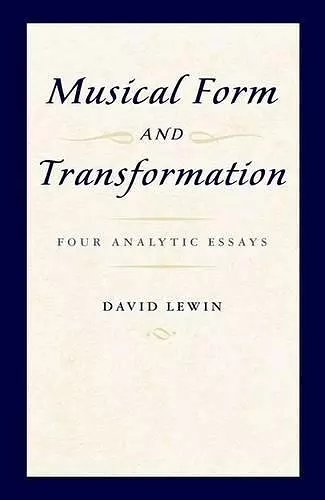Musical Form and Transformation
Four Analytic Essays
Format:Paperback
Publisher:Oxford University Press Inc
Published:13th Jan '11
Currently unavailable, and unfortunately no date known when it will be back
This paperback is available in another edition too:
- Hardback£59.00(9780195317121)

Distinguished music theorist and composer David Lewin (1933-2003) applies the conceptual framework he developed in his earlier, innovative Generalized Musical Intervals and Transformations to the varied repertoire of the twentieth century in this stimulating and illustrative book. Analyzing the diverse compositions of four canonical composers--Simbolo from Dallapiccola's Quaderno musicale di Annalibera ; Stockhausen's Klavierstuck III ; Webern's Op. 10, No. 4; and Debussy's Feux d'articifice --Lewin brings forth structures which he calls "transformational networks" to reveal interesting and suggestive aspects of the music. In this complementary work, Lewin stimulates thought about the general methodology of musical analysis and issues of large-scale form as they relate to transformational analytic structuring. Musical Form and Transformation , first published in 1993 by Yale University Press, was the recipient of an ASCAP Deems Taylor Award.
No one can match David Lewin's ability to present detailed analyses of 20th-century music in such a way that the committed reader can absorb them in all of their richness. Beyond their originality and interpretive mastery, these essays are indispensable for their stylistic qualities. * Richard L. Cohn, Battell Professor of the Theory of Music, Yale University *
David Lewin's great gift was his ability to connect sophisticated mathematics to musical experience in ways that were deeply compelling, never losing sight of either the music, or the experience. Together these two volumes display both his theoretical brilliance and his sensitivity to the individuality of musical works. Most significantly, they are imbued with his unflagging dedication to and abiding love for the acts of making and understanding music. * Andrew Mead, Professor of Music, University of Michigan *
David Lewin's work is among the most important on music theory in the twentieth century. Through some of the examples of practical applications, Generalized Musical Intervals and Transformations was the inception and theoretical basis of the 'Neo-Riemannian' strand of tonal music theory. In addition, its transformational network analysis paradigm has become part of every music theorist's standard repertory for analysis, and has since been extended by Lewin himself, Klumpenhouwer, Lambert, Stoecker, Headlam, Rahn, and Mazzola among many others. The analytical essays in Musical Form and Transformations illustrate the new analytical paradigm Lewin introduced in Generalized Musical Intervals and Transformations. These seminal works on music theory are essential reading. * John Rahn, Professor of Music, University of Washington *
While David Lewin's thought had been animated for decades by some of these books' ideas---the complex significance of interval, the audibility of pitch-class inversional indices, the definition of directed motion more by context than convention---it was their concentrated presentation here that enabled many readers to assimilate them as a 'theory.' The result was a shift in the discipline's conception of its methods, even its goals, to the point where imitation of the books (of their imitable aspects) could become a career path. In a renewed encounter with the originals, we are confronted once more by Lewin's intellectual probity, his intense concern with every construction's relation to hearing (which need not mean anything so simple as that every construction is heard), his fastidious eschewal of hype. With these taken as exemplary, the field would change again. * Joseph Dubiel, Professor of Music, Columbia University *
ISBN: 9780199759958
Dimensions: 229mm x 152mm x 11mm
Weight: 281g
192 pages